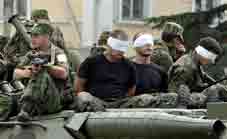The longer they stay, the more we resist
By Shorena Labadze
Wednesday, August 20

According to foreign and Georgian press correspondents in the occupied areas there isn’t any noticeable movement of the Russian soldiers. Approximately 100 tanks are mobilized near Gori in the village of Shavshvebi. The Russians have established checkpoints at every hundred metres. They ask journalists to present accreditation cards given by the Russian Foreign Affairs Ministry if they wish to enter. Gori residents are allowed to enter the city on foot, but hardly any people have been seen there.
Georgian journalists say that Georgian soldiers at Poti Port, which has been under Russian control for several days, have been disarmed and detained. Russian soldiers are either stealing and damaging military hardware and installations there. On August 19 they sunk another naval vessel, used to transport humanitarian aid from different countries for Georgian refugees.
The journalists have been unable to approach the Poti Port in recent days because the Russian aggressors have threatened that they will open fire on them if they do. They therefore monitor the situation from neighbouring districs. According to the Georgian journalists, Russian soldiers have blindfolded a group of Georgians and led them in the direction of Zugdidi. Georgia is talking to Russian officials about this incident.
Nevertheless, the country refuses to quieten down. A protest rally has been held in Igoeti by Georgian students. Their demand was the same one everyone else is making: they want the Russian invaders to leave Georgia. More than 3,000 people attended the protest, including Georgian and foreign businessmen who claimed that in spite of the turbulent situation they are not going to stop investing in the country.
The protest approached a detachment of Russian soldiers. When the demonstrators were about 30 metres away, the soldiers mobilized and clutched their automatic weapons. The protestors did not approach any nearer, but they didn’t stop chanting “Stop Russia” and “Georgia”. They waved placards bearing slogans such as “Russian aggression out of Georgia!”. At the end, Georgian protestors were standing only 5 metres from the Russian soldiers, singing the national anthem. When one of them went up to a Russian soldier and told him the Georgian people know how to fight as well as to offer good friendship, the Russian soldier told him he had no right or time to think for himself as “the officials think instead of him”.
This protest achieved nothing. As the Russian soldiers said, “Georgian people can sing and cry as much as they want”. But a similar rally was also held in Senaki near Zugdidi. This too attracted over 1,000 people.
After serving the liturgy for the Feast of Transfiguration, the spiritual leader of all Georgia, Catholicos-Patriarch Ilia II, urged people to be patient and not despair. “Maybe even Georgia hasn’t experienced such a disaster before, but we must remain strong. This situation is a huge threat, but at the same time, this means that Georgia will surely receive great mercy from God very soon,” The Patriarch said.
The Georgia’s Writers’ Union has released a special address protesting against Russian aggression towards Georgia. “We condemn the violence of barbarians and their desire to occupy Georgia,” it reads. The document will be sent to all the writers’ organizations or assemblies of Europe. Georgian writers demand a serious response to the violent crimes of the Russia invaders.
The European Artists’ Council plans to hold a special meeting at which Russia’s illegal actions is will be discussed.
The leader of the National Freedom Party Irakli Tsereteli, as a way of condemning Russia’s cruel aggression, has begun a hunger strike outside the Georgian Parliament building. His main demand is that Russia withdraw its soldiers from Georgia. Tsereteli calls on Europe not to baulk from any step, even military intervention, if Russia prolongs its withdrawal. He has declared he will not stop his hunger strike until the Russians leave Georgia.
